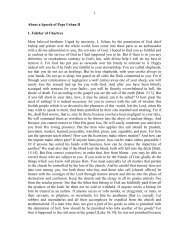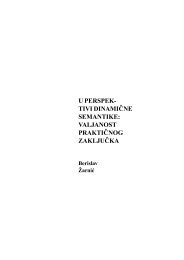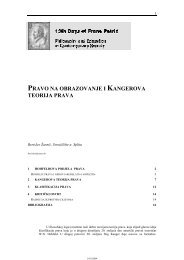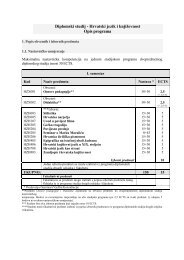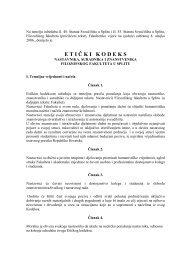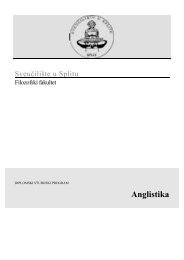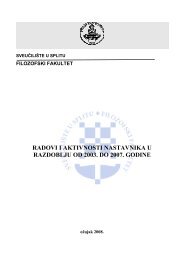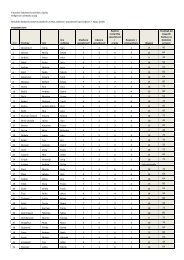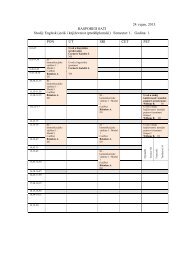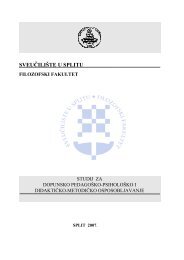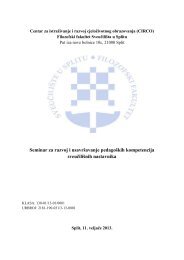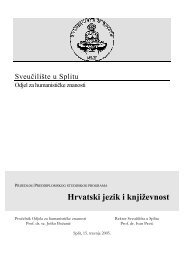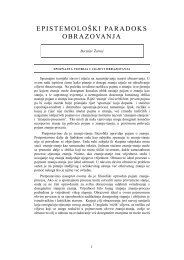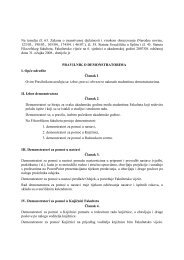English Studies
English Studies
English Studies
You also want an ePaper? Increase the reach of your titles
YUMPU automatically turns print PDFs into web optimized ePapers that Google loves.
G R A D U A T E D E G R E E P R O G R A M M E : E N G L I S H S T U D I E S<br />
Prerequisites<br />
Course contents<br />
Recommended<br />
reading<br />
Supplementary<br />
reading<br />
Teaching<br />
methods<br />
Assessment<br />
methods<br />
Language of<br />
instruction<br />
Quality<br />
assurance<br />
methods<br />
Completion of the first semester of graduate studies.<br />
Here are some of the themes covered: origin of language; language<br />
universals; language and cognition; how language exists in the speech<br />
community; the acquisition of language; is language innate or learned; what<br />
is the relationship of language and thought; how is language a guide to<br />
reality; are we prisoners of our language; how do we learn about things in<br />
the world, where and how words acquire their meanings; what is the<br />
relationship of language and thought; nominalism, mentalism and platonism<br />
in the philosophy of language and linguistics.<br />
Aitchison, J. (1987). Words in the Mind: An Introduction to the Mental<br />
Lexicon. Oxford: Basil Blackwell.<br />
Chomsky, N. (1976). Reflections on Language. London: Temple Smith.<br />
Downes, W. (1984). Language and Society. London: Fontana Paperbacks.<br />
Pinker, S. (1994). The Language Instinct. London: Penguin Books.<br />
Bickerton, D. (1990). Language and Species. Chicago: University of<br />
Chicago Press.<br />
Jutronić, D. Lingvistika i filozofija. (1991). Zagreb, Hrvatsko filozofsko<br />
društvo.<br />
Katz, J. (Ed.) (1985). The Philosophy of Linguistics. Oxford: Oxford<br />
University Press.<br />
Devitt and Sterelny. (1999). Language and Reality: An Introduction to the Philosophy of<br />
Language. Cambridge: MIT Press.<br />
1. Lectures (traditional with student-participation encouraged, asking<br />
questions for clarification).<br />
2. Seminars (each student writes a seminar paper which is then presented in<br />
the classroom. Work group or work in pairs is possible depending on the<br />
assigned task)<br />
3. Close readings of some selected passages.<br />
1. Active participation in the classroom discussion; an oral presentation of<br />
the seminar work.<br />
2. Written and oral exam at the end of the course.<br />
<strong>English</strong>.<br />
Student feedback via questionnaires.<br />
Course title Literary Cinema<br />
Course code<br />
Type of course<br />
Level of course<br />
HZE807<br />
Seminar / Advisory hours<br />
Elective Course<br />
Specialised level course<br />
42



